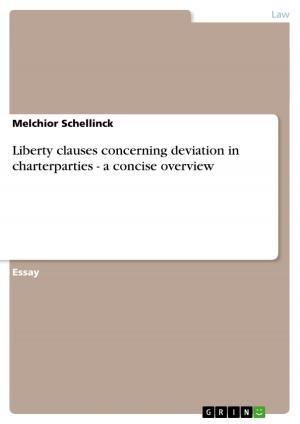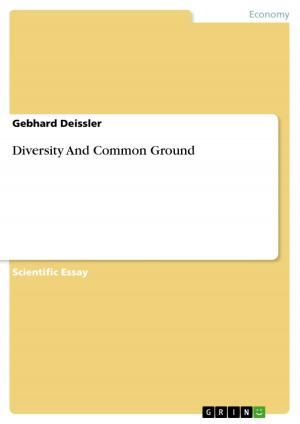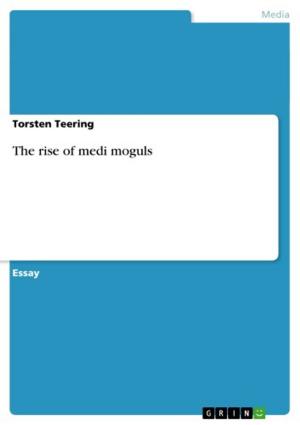Seeking roots of discrimination
A comparative examination of Langston Hughes's and Richard Wright's essays and newspaper columns of social protest
Nonfiction, Entertainment, Drama, Anthologies| Author: | Bert Bobock | ISBN: | 9783640106875 |
| Publisher: | GRIN Publishing | Publication: | July 21, 2008 |
| Imprint: | GRIN Publishing | Language: | English |
| Author: | Bert Bobock |
| ISBN: | 9783640106875 |
| Publisher: | GRIN Publishing |
| Publication: | July 21, 2008 |
| Imprint: | GRIN Publishing |
| Language: | English |
Intermediate Examination Paper from the year 2002 in the subject American Studies - Culture and Applied Geography, grade: 1,7, Humboldt-University of Berlin (Department of English and American Studies), course: Introduction to US Cultural Science II: 'The Thirties', 10 entries in the bibliography, language: English, abstract: Although much of Langston Hughes's and Richard Wright's writing expressed social protest, there is one genre -the essay- that has gone largely unnoticed. In the eyes of Hughes and Wright, custom, tradition and religion may be seen as some of the root causes of racism because they are largely interiorized, but they by far cannot serve alone as satisfying explanations for it. Important in the creation of racism is e.g. the negative projection of colored people in the media. Consequently, this forms a fatal preconception of blacks that is constantly being reproduced. Langston Hughes and Richard Wright, among the most prolific of American writers, gained international attention and acclaim in nearly every genre of writing, including poetry, the short story, the novel, drama, the libretto, the autobiography, journalistic prose, children's and adolescent literature and song lyrics. Although much of their writing, often expressing social protest, was easily accessible to scholars and general readers, there is one genre -the essay- that has gone largely unnoticed. Yet such essays and short, non-fiction passages contribute significantly to Hughes's and Wright's work, striving for racial equality on a local level, a national, as well as global levels. At first glance, it may appear fruitless to compare the non-fiction works of Hughes and Wright, since the writers became famous for their poetry and fictional masterpieces. Also, a comparison between Wright's rather epic artistic style and Hughes's dense, often ironic prose may seem unlikely and difficult. Yet, on closer inspection, you will find that both writers are surprisingly close to one another in their way of thinking, and their conclusions often overlap. Hughes was a columnist for the famous African-American newspaper, the 'Chicago Defender,' where he commented on contemporary issues and chronicled the hopes and despairs of his people. In spite of the different origins of the writers, Hughes and Wright were confronted early on with race discrimination and segregation, publicly know as 'Jim Crow-ism1,' which was identified and condemned in their essays.
https://www.linkedin.com/in/bertbobock
Intermediate Examination Paper from the year 2002 in the subject American Studies - Culture and Applied Geography, grade: 1,7, Humboldt-University of Berlin (Department of English and American Studies), course: Introduction to US Cultural Science II: 'The Thirties', 10 entries in the bibliography, language: English, abstract: Although much of Langston Hughes's and Richard Wright's writing expressed social protest, there is one genre -the essay- that has gone largely unnoticed. In the eyes of Hughes and Wright, custom, tradition and religion may be seen as some of the root causes of racism because they are largely interiorized, but they by far cannot serve alone as satisfying explanations for it. Important in the creation of racism is e.g. the negative projection of colored people in the media. Consequently, this forms a fatal preconception of blacks that is constantly being reproduced. Langston Hughes and Richard Wright, among the most prolific of American writers, gained international attention and acclaim in nearly every genre of writing, including poetry, the short story, the novel, drama, the libretto, the autobiography, journalistic prose, children's and adolescent literature and song lyrics. Although much of their writing, often expressing social protest, was easily accessible to scholars and general readers, there is one genre -the essay- that has gone largely unnoticed. Yet such essays and short, non-fiction passages contribute significantly to Hughes's and Wright's work, striving for racial equality on a local level, a national, as well as global levels. At first glance, it may appear fruitless to compare the non-fiction works of Hughes and Wright, since the writers became famous for their poetry and fictional masterpieces. Also, a comparison between Wright's rather epic artistic style and Hughes's dense, often ironic prose may seem unlikely and difficult. Yet, on closer inspection, you will find that both writers are surprisingly close to one another in their way of thinking, and their conclusions often overlap. Hughes was a columnist for the famous African-American newspaper, the 'Chicago Defender,' where he commented on contemporary issues and chronicled the hopes and despairs of his people. In spite of the different origins of the writers, Hughes and Wright were confronted early on with race discrimination and segregation, publicly know as 'Jim Crow-ism1,' which was identified and condemned in their essays.
https://www.linkedin.com/in/bertbobock















